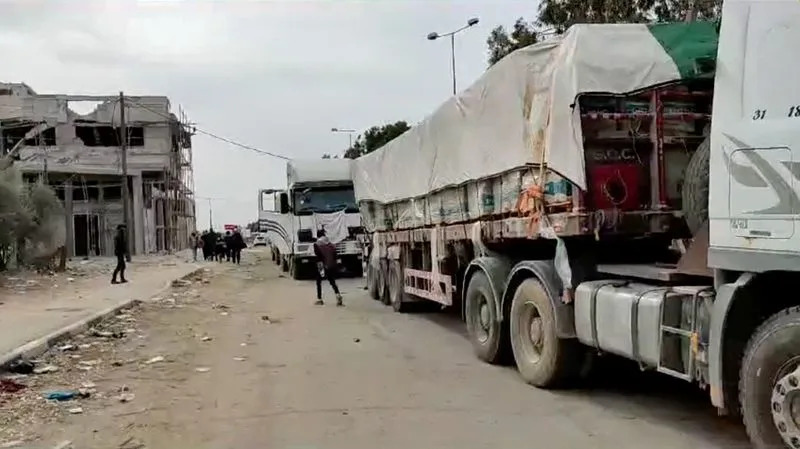A U.N. official who took part in a humanitarian aid convoy to northern Gaza said on Sunday aid groups were on track to deliver the biggest shipment in over a month, describing thin, gaunt residents slaking their thirst as soon as water arrived.
Palestine Red Crescent Society footage shows trucks with aid bound for north Gaza.
Before a four-day truce between Israel and Hamas got underway on Friday, U.N. agencies had voiced fears of disease and dehydration in the north, cut off from outside aid for weeks in a siege within a siege. The UN previously said it could not get safe passage and medical groups who remained active like the International Red Cross came under fire there.
"People are so desperate and you can see in adults' eyes they haven't eaten, you can see the children are getting thinner," the U.N. children's agency's James Elder told Reuters by video link from southern Gaza after returning from Gaza City.
"There's just this immense relief. Literally people as they get water start drinking the water immediately," he said. "They're thirsty. They've been thirsty for days."
UNICEF's Elder took part in a five-truck convoy on Sunday alongside other U.N. agencies delivering high-energy biscuits, vitamin tablets for children as well as medical kits. A dispute over aid flows to the north of the Israeli-besieged enclave temporarily held up a deal to free captives on Saturday.
The deliveries were made to hospitals where rations were controlled, Elder said. He described seeing children, often with multiple injuries including burns and shrapnel wounds, lying in hospital beds in a state of shock. "They look like they'd been broken and then badly put back together," he said.
"It seems callous and cold to think that we may be getting to the end of those deliveries and hostilities will continue, (that) the war, this war on children will continue."
Even as the aid deliveries flowed north, Elder said he saw hundreds of Gazans heading in the other direction, fearing the renewal of Israeli bombardments if the four-day truce is not prolonged. "People are so terrified that this pause won't be continued ... I saw grandmothers carrying children, children pushing grandmothers in wheelchairs through the dust," he said.
Palestinian Red Crescent Says Largest Convoy of Aid Delivered as Hamas Disputes Israel Compliance With Truce Terms.
The second release of hostages was delayed on Saturday, November 25, after the military wing of Hamas said Israel failed to meet the terms of the truce, including an agreement related to the entry of trucks bringing aid to northern Gaza.
The Palestine Red Crescent Society (PRCS) said on Saturday that a convoy of 61 aid trucks entered Gaza, calling it the “biggest one to bring aid to Gaza and the Northern Governorates since the beginning of the ongoing escalation of 50 days so far.”
The Israel Defense Forces had said on Saturday that 200 aid trucks entered Gaza on Friday, and that another 200 were expected to arrive in Gaza on Saturday. During a Saturday news conference in Lebanon, a senior Hamas official said that less than half the agreed-upon number of aid trucks had reached northern Gaza since the temporary ceasefire began, outlets reported.
“The Al-Qassam Brigades decide to delay the release of the second batch of prisoners until the occupation adheres to the terms of the agreement related to the entry of relief trucks into the northern Gaza Strip, and due to failure to adhere to the agreed-upon standards for releasing prisoners,” Hamas said in a Telegram post on Saturday, according to machine translation.
A spokesperson for Qatar’s Ministry of Foreign Affairs said the exchange of Palestinians and Israelis would resume.
UN says 61 trucks deliver aid in northern Gaza.
The United Nations on Saturday said 61 trucks carrying medical supplies, food and water had delivered their payloads in northern Gaza, as a pause in fighting allows aid to enter the besieged coastal territory.
Another 200 trucks had been dispatched to the Gaza Strip from Nitzana, Israel, the UN Office for the Coordination of Humanitarian Affairs (OCHA) said in a statement, with 187 of them having made it past the border by the early evening local time.
Eleven ambulances, three coaches and a flatbed were delivered to Al-Shifa hospital, which had seen heavy fighting in recent days, "to assist with evacuations," the statement said.
"The longer the pause lasts, the more aid humanitarian agencies will be able to send in and across Gaza," it added, thanking the Palestinian and Egyptian Red Crescent groups.
The day prior, when a temporary truce between Israel and Hamas began in order to facilitate the hostage and prisoner exchange, a total of 137 trucks had delivered aid in Gaza, according to the UN.
"We welcome the release of more hostages today and renew our call for the immediate and unconditional release of all hostages," the OCHA said.
"And we hope the release of more Palestinian detainees brings relief to their families and loved ones."
Exchanges continued into early Sunday, local time, with Hamas expected to free a total of 50 hostages during the four-day truce in exchange for 150 Palestinian prisoners, under an agreement brokered by Qatar, Egypt and the United States.
Hamas fighters snatched around 240 people when they broke through Gaza's militarized border with Israel on October 7, killing about 1,200 Israelis and foreigners, according to Israeli authorities.
Following the deadliest attack in its history, Israel launched an air, artillery and naval bombardment alongside a ground offensive to destroy Hamas, killing nearly 15,000 people, mostly civilians and including thousands of children, according to the Hamas government in Gaza.




